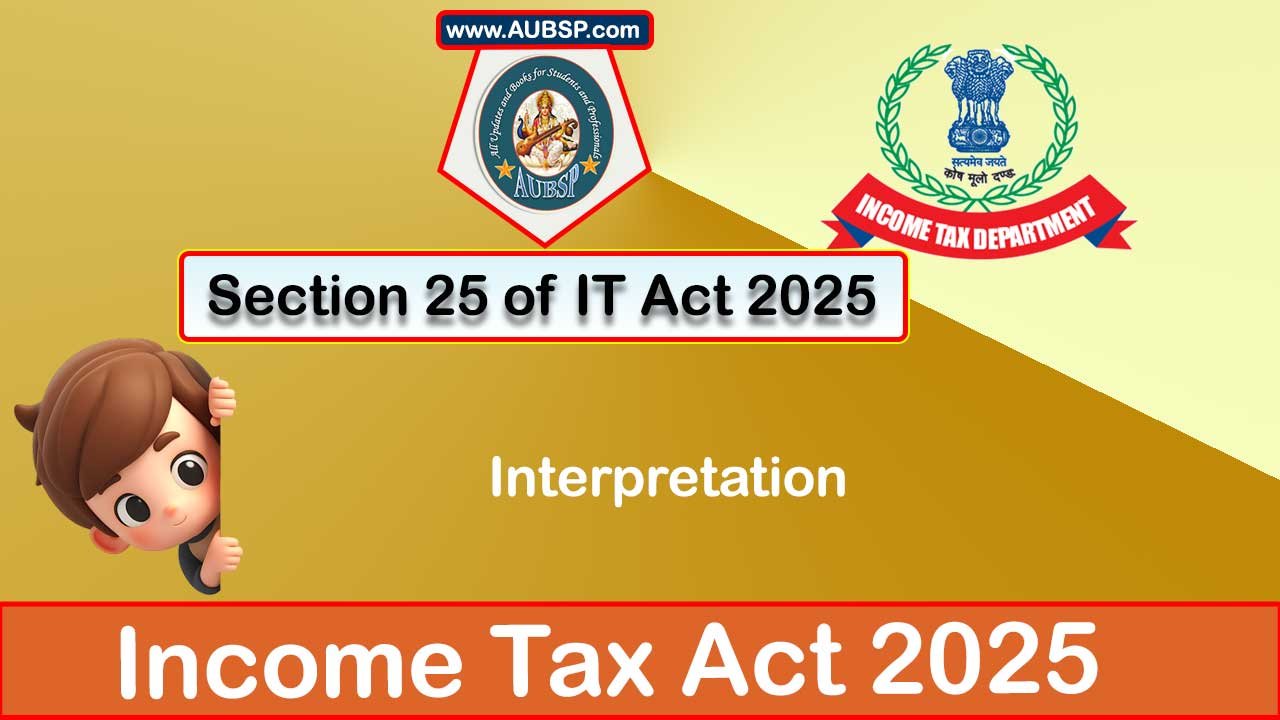Interpretation
[As per the Income Tax Act, 2025 (this Act) w.e.f. 1st April, 2026.]
For the purposes of sections 20 to 24, the “owner” in relation to a property shall include––
- (a) an individual who transfers without adequate consideration, any property to the spouse (except under an agreement to live apart), or to a minor child (other than a married daughter);
- (b) the holder of an impartible estate;
- (c) a member of a co-operative society, company or other association of persons to whom a building or part thereof is allotted or leased under a house building scheme of the society, company or association;
- (d) a person who is allowed to take or retain possession of any building or part thereof in part performance of a contract of the nature referred to in section 53A of the Transfer of Property Act, 1882;
- (e) a person who acquires any rights (excluding any rights by way of a lease from month to month or for a period not exceeding one year) in or with respect to any building or its part—
- (i) by virtue of transfer of such property by way of sale or exchange or original or extendible lease for a term of not less than twelve years; or
- (ii) accruing or arising from any transaction (whether by way of becoming a member of, or acquiring shares in, a co-operative society, company or other association of persons or by way of any agreement or any arrangement of whatever nature), not being a transaction by way of sale, exchange or lease which has the effect of enabling the enjoyment of such property.
FAQs on Section 25 of Income Tax Act 2025
1. What is the scope of Section 25 of the Income Tax Act, 2025?
Section 25 defines the meaning of “owner” in relation to property for the purposes of Sections 20 to 24. It includes not only the legal owner but also individuals who hold property under specific conditions.
2. Who is considered an “owner” under Section 25?
The following individuals or entities are considered owners for tax purposes:
- Those who transfer property to a spouse (except in cases of separation) or a minor child (except a married daughter).
- Holders of impartible estates.
- Members of a cooperative society, company, or association receiving property under a house-building scheme.
- Those with possession under a contract as per Section 53A of the Transfer of Property Act, 1882.
- Those who acquire rights over a property through sale, exchange, or a long-term lease (12 years or more).
- Individuals with property rights through membership in a cooperative society, company, or association.
3. Does a person need to have legal title to be considered an “owner” under this section?
No. Ownership under this section is based on possession and rights rather than just legal title. Even individuals holding property through certain agreements or transactions may be deemed owners.
4. What happens if a property is transferred to a spouse?
If a property is transferred without adequate consideration to a spouse (except under an agreement to live apart), the original owner is still considered the deemed owner for tax purposes.
5. Are minor children considered owners if property is transferred to them?
A minor child (except a married daughter) who receives property without adequate consideration does not become the owner for tax purposes; the transferor remains the deemed owner.
6. What is an “impartible estate” under this section?
An impartible estate refers to property that, by custom or legal provision, cannot be divided among heirs and is inherited by a single successor. The holder of such an estate is considered its owner.
7. How does this section apply to cooperative societies and companies?
If a building or a part thereof is allotted or leased under a house-building scheme of a cooperative society, company, or association, the member receiving the allotment or lease is considered the owner.
8. What is the relevance of Section 53A of the Transfer of Property Act, 1882?
This section applies to individuals who have possession of a property under an agreement where the seller has agreed to transfer the property but legal title has not yet been transferred. Such persons are considered owners under Section 25.
9. What is the minimum lease duration for a lessee to be deemed an owner?
A lessee will be deemed an owner if the lease is for at least 12 years, including any renewal options. Shorter leases (month-to-month or those under a year) do not qualify.
10. Does acquiring shares in a company or cooperative society make someone a property owner
Yes, if acquiring shares in a company, cooperative society, or association of persons results in the right to enjoy a property, the individual is deemed an owner, even if the transaction is not a direct property sale.
Section 25 of the Income Tax Act, 2025 broadens the definition of “owner” beyond just legal titleholders. It includes individuals who have acquired rights over a property through transfer, long-term leases, cooperative society memberships, or possession under certain contracts. This ensures that tax liabilities related to property ownership are appropriately assigned, preventing tax avoidance through indirect ownership structures.
By establishing a comprehensive framework for deemed ownership, Section 25 ensures clarity in taxation, particularly for cases involving spousal transfers, minor children, cooperative housing, long-term leases, and contractual possession rights. Taxpayers must carefully assess their property-related transactions to understand their ownership status under this provision.

